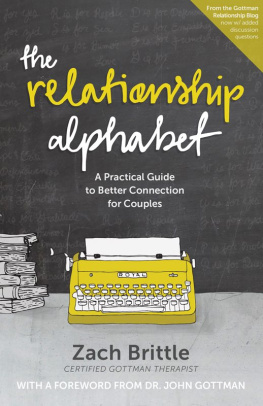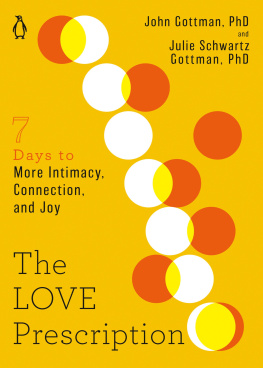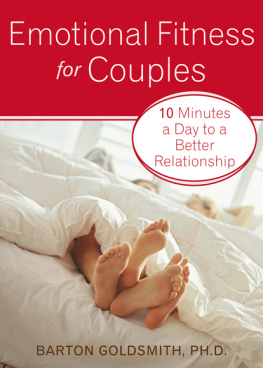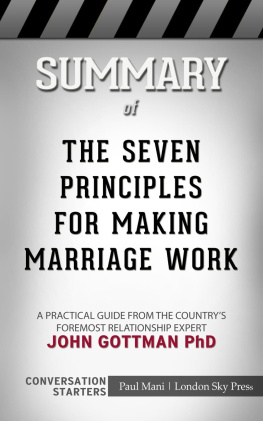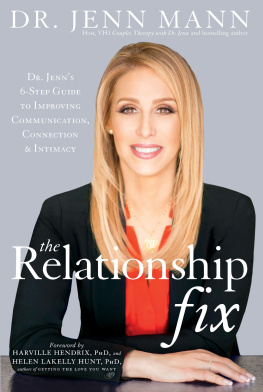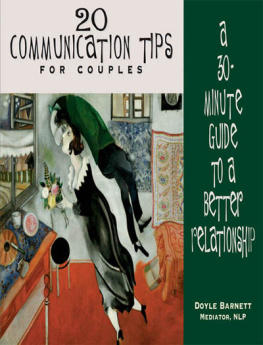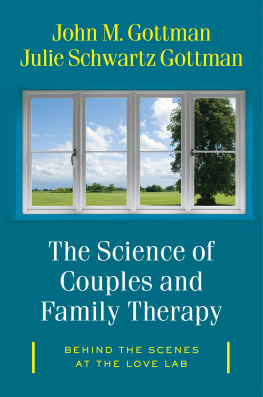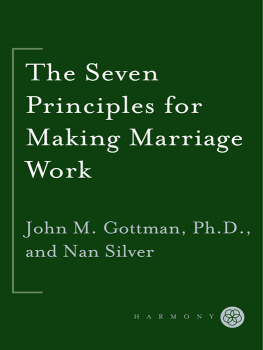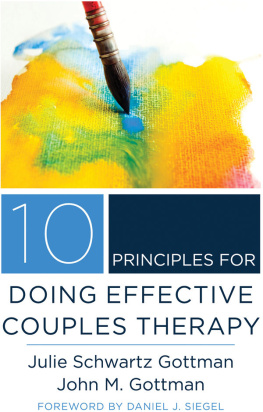Acknowledgments
It took me nearly 40 years to allow myself to be a writer. I have Rev. Frederick Buechner to blame for that. For me, the experience of reading Buechner is the experience of nodding and mulling and thinking, I wish Id written that. But it didnt need to be written. And so I didnt. Indeed, I didnt write a lot of things because of Frederick Buechner.
But Buechners writing, more than most, has changed the way I think about language and life and even love. His Whistling in the Dark: A Doubters Dictionary is the inspiration for working through the alphabet. In the M section of that book, Buechner describes an ideal marriage as one where two partners, become more richly themselves together than the chances are either of them could have managed to become alone. This vision sustains the work I do with couples and is the thread that connects most of what Ive proposed in The Relationship Alphabet. I suppose that means Frederick Buechner is also the reason that I do write. So, thank you sir.
Thanks to The Gottman Institute for the opportunity to contribute and for being so generous and open-handed with your content. Thanks to Drs. John and Julie Gottman and the countless therapists, researchers, and even couples who make this content so accessible and compelling., Ive grown as a therapist, husband, and person by exploring and mucking about in this incredible body of knowledge through the year. Thank you for the incredible gift your work is to the world.
I owe a huge debt of gratitude to Michael Fulwiler, who was both my main source of accountability and primary cheerleader. Many, many thanks to Lindsey Thompson who brilliantly crafted the design vision for the book. And to Jo Vance, who edited my first drafts quickly, thoroughly, and graciously. Finally, I am exceedingly grateful to Anne Kennedy Brady, a powerful writer and editor, who also happens to be very good at being married. Her critical eye and curious mind brought these posts to life and will no doubt inspire many conversations for readers.
The greatest measure of my thanks belongs to my wife Rebecca who has been my primary sounding board, fact-checker, and skeptical-look-giver throughout this process. Theres no one else in the world Id rather spend my days arguing with, turning toward, and learning to love. Thanks for writing this relationship story with me.
Zach Brittle
June 2015
P.S. I would be remiss not to thank you, the reader. I appreciate that you have given me the opportunity to speak into the small corners of your relationship. More, I appreciate that you are taking the time to focus on the process of becoming more richly yourselves together. If I can be of help to you in any way, please dont hesitate to email me at or on Twitter (@kzbrittle).

Adapted from The Gottman Relationship Blog
2015 Zach Brittle.
All rights reserved. No part of this publication may be reproduced, distributed, or transmitted in any form or by any means, including photocopying, recording, or other electronic or mechanical methods, without the prior written permission of the publisher, except in the case of brief quotations embodied in critical reviews and certain other noncommercial uses permitted by copyright law. For permission requests, email the publisher at the address below.
Zach Brittle, LMHC
www.zachbrittle.com
www.relationshipalphabetbook.com
ISBN: 9781483555423
Table of Contents
Foreword from Dr. John Gottman
For the last 20 years, Julie and I have dedicated our lives to making the information from the research lab widely accessible for couples to use to strengthen their relationships. Weve written books, given radio and television interviews, delivered keynote lectures, and taught workshops around the world, but none of those efforts compare to the exponential reach provided by the internet.
Our team at The Gottman Institute has been able to reach and engage with millions of couples through content shared on social media and on the Gottman Relationship Blog . Zach Brittle has been a primary contributor to the blog, and his Relationship Alphabet series has been one of our most popular with readers. It has been extremely gratifying to see so many people benefit from his work.

Zach was part of a small group of researchers I personally trained over a period of several years with the Bringing Baby Home program. As a Certified Gottman Therapist, he is a member of an exclusive cohort of expert clinicians. He has a firm grasp of the research foundation of the Gottman Method and the ability to clearly communicate it to others.
I have the greatest respect for Zach, and what he has accomplished with The Relationship Alphabet is simply amazing. From Arguments to Kissing to Turning, the chapters that follow bring the research to life with creativity, warmth, and humor. I am indebted to Zach for his sensitivity and honesty in writing this book. I know that his insights into the research and the questions that accompany his reflections will help couples achieve long-lasting, satisfying relationships.
John M. Gottman
June 2015
A
A is for Arguments
Just for kicks, I decided to ask Google for help finding marriage and relationship words that start with A. I got a lot of help with my Scrabble game, but not too much else. I did find one site dedicated to marriage vocabulary. The list of A words included: Acceptance, Admiration, Affection, Affinity, Allegiance, Appreciation, Approval, and Attentive.
All of those words are relevant and essential to healthy relationship. Theyre good words. And while I think that you and your partner should accept, admire, and all those other things, I also think you should argue. Maybe its just me, but I think if youre not arguing, youre probably not committed.
When engaged couples come into my office for pre-marital counseling, one of my first questions is, Could you tell me about when, how, and why you argue? If they dont or cant or wont argue, thats a major red flag. If youre in a committed relationship and you havent yet had a big argument, please do that as soon as possible. Its important for you to understand the anatomy of your arguments so that you can uncover the patterns and themes that recur. Most importantly, its critical for you to know that arguing is okay. It can even be productive.
Its critical for you to know that arguing is okay. It can even be productive.
When I begin therapy with a couple, I ask them to argue with one another during the first few sessions, just so we can normalize it a bit. Arguing is just part of the dealits one of the permissions of a committed relationship, kind of like sex. Think about it, you get to have sex with your partner and you get to yell at them at the top of your lungs. Can you do that with a colleague at work? (If you answered yes, maybe you should find a new job.)
John Gottman discovered that about two-thirds of all arguments are perpetual. This means that, most likely, five years from now youll be fighting about the same thing you were fighting about five years ago. It might be her mother, or the way you put away the dishes, or his introversionit doesnt matter. Sixty-nine percent of your problems are not going away. Its a simple, statistical fact.
Now consider this question: Is that discouraging or encouraging? Typically, when my clients find Gottmans statistic discouraging, its because they know exactly what their perpetual problems are and they feel overwhelmed at the thought of spending the next thirty-five years arguing about them. But when the numbers
Next page
